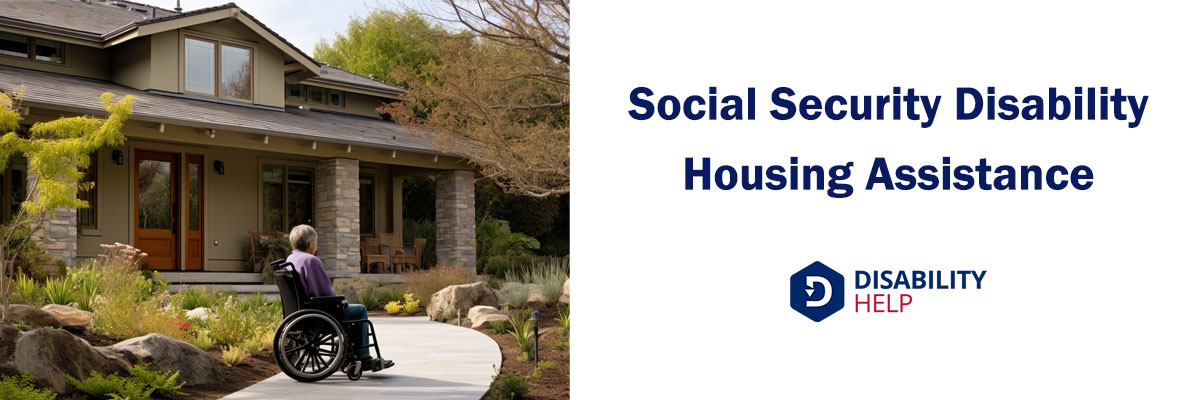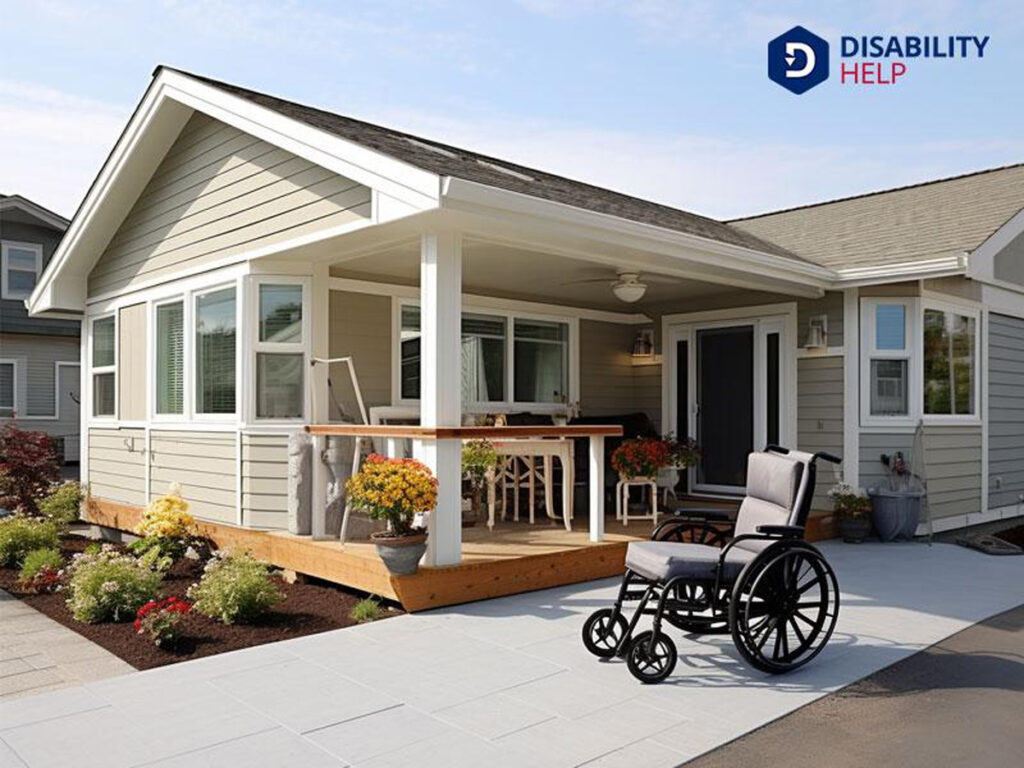While the Social Security Administration (SSA) provides disability benefits, it does not directly offer housing or rent assistance. However, other federal programs are available.[1]
One of the most well-known programs administered by HUD, Section 8 offers housing vouchers that subsidize the rent for qualifying individuals, ensuring they spend at most 30% of their income on housing.[2]
Those relying solely on Social Security Disability Insurance (SSDI) benefits often struggle to afford housing due to limited income, especially in the competitive U.S. rental market.
The NHTF is a continuous fund, but 10% of its resources are dedicated to rental housing. his ensures that renting remains a viable option for those who might not be able to buy a home.[3]
Many individuals with disabilities face significant barriers in securing affordable and accessible housing, putting them at risk of institutionalization or destitution.
There are many obstacles to housing for people with disabilities. Many disabled people are at risk of institutionalization or poverty in the absence of affordable, accessible housing in the community.
Disabled people who rely solely on Social Security Disability Insurance (SSDI) benefits without additional income may have trouble affording housing or rent. SSDI recipients are frequently only able to afford the rental market in the United States due to their low income if they have another source of livelihood.

Special Homes For the Disabled Are Often More Expensive
Complicating matters, disabled people typically require housing that is specifically tailored to their needs. They frequently require purpose-built housing, including handrails in bathrooms and showers, wheelchair-accessible kitchens, and other features that cater to their limitations.
Finding housing with even basic accessibility features can be difficult, if not impossible or unaffordable, for people who use mobility devices. As a result, accessible housing for the disabled is commonly more expensive due to these accommodations and requirements.
Fast Facts
Individuals with disabilities often face barriers in securing affordable housing, with many at risk of institutionalization or destitution due to the high costs and limited accessibility features.
Does The SSA Offer Disability Housing Assistance?
Numerous people become homeless or are at risk of becoming homeless while their disability claim is being processed. While the Social Security Administration (SSA) provides disability benefits, it does not offer housing or rent assistance directly. However, other federal programs are available[1]. With this in mind, one might inquire more about the Security Administration (SSA) providing disability housing assistance to its beneficiaries.
Regardless of the type of disability benefits you receive, the agency does not provide housing or rent assistance. Fortunately, the federal government offers housing assistance programs.
Programs That Provide Affordable Housing to Disabled Americans
Navigating the housing market as a disabled individual can be challenging. However, there are several federal, state, and local housing programs designed specifically to assist those with disabilities. These programs aim to help individuals find affordable housing, modify existing homes, and equip them with the skills to live independently. Here's a deeper dive into some of these programs:
United States Department of Housing and Urban Development
- Overview: HUD oversees various programs to provide affordable housing solutions for Americans, including those with disabilities.
- Section 8 Housing Vouchers: One of the most well-known programs administered by HUD, Section 8 offers housing vouchers that subsidize the rent for qualifying individuals, ensuring they spend at most 30% of their income on housing[2].
- Section 811 - Supportive Housing for Persons With Disabilities: This program is designed for disabled individuals. It not only subsidizes rental housing but also ensures that these options come with the necessary supportive services that cater to the unique needs of disabled individuals[2].
- Application Process: Local public housing authorities (PHAs) distribute Section 8 and Section 811 vouchers. While these vouchers are available nationwide, the demand often exceeds the supply, leading to waitlists in many areas.
National Housing Trust Fund
- Overview: The NHTF is a federal initiative aimed at preserving and expanding affordable housing for low-income families, including those with disabled members.
- Allocation: While the NHTF is a continuous fund, it earmarks 10% of its resources specifically for rental housing. This ensures that renting remains a viable option for those who might not be able to buy a home[3].
- Additional Assistance: Beyond housing, the NHTF recognizes that utilities are a significant expense for many families. As such, they often collaborate with programs like the Low Income Home Energy Assistance Program to provide relief.
Distribution: The funds from the NHTF are channeled through both for-profit and not-for-profit organizations at the state level. These organizations are bound by the guidelines set by the Affordable Care Act (ACT) to ensure that the funds are used judiciously and reach the intended beneficiaries.
Fast Facts
Those relying solely on Social Security Disability Insurance (SSDI) benefits frequently struggle to afford housing in the competitive U.S. rental market, emphasizing the need for assistance programs.
Testimonials on SSD Housing Assistance
Hearing firsthand experiences can provide invaluable insights. Below are testimonials from individuals who have navigated the SSD Housing Assistance landscape, sharing their challenges and triumphs in securing suitable housing.
Jane D., Austin, TX:
"After my accident, I was worried about how I'd manage my housing expenses. Thanks to the Section 8 vouchers, I've been able to afford a comfortable home that's been adapted to my needs. It's been a lifesaver!"
Luis R., Miami, FL:
"I never thought I'd be able to live independently with my disability. The Supportive Housing for Persons With Disabilities program has not only given me a place to call home but also the supportive services that help me live on my own. I'm truly grateful."
Aisha K., Denver, CO:
The National Housing Trust Fund has been a blessing for my family. With their assistance, we've been able to secure a rental property in a safe neighborhood. The additional utility assistance has also eased our financial burden significantly."
Eligibility Criteria for SSD Housing Assistance:

To qualify for SSD Housing Assistance, applicants must meet specific criteria to ensure the aid reaches those most in need:
- Documented Disability: Applicants must provide official documentation confirming their disability. This can be a medical certification, a letter from a treating physician, or documentation from the Social Security Administration.
- Income Limits: The majority of housing assistance programs have income restrictions. Typically, an applicant's income must fall below a set threshold, often determined by the Federal Poverty Level (FPL) or a percentage of the Area Median Income (AMI).
- Residency: Applicants should be U.S. citizens or have eligible immigration status. Proof of residency, such as a driver's license, utility bill, or lease agreement, may be required.
- Current Housing Status: Some programs prioritize individuals who are homeless or at imminent risk of becoming homeless.
- Other Criteria: Depending on the specific program, there might be additional eligibility factors, such as family size, age, or veteran status.
It's essential to review the guidelines of each specific program, as eligibility criteria can vary.
Fast Facts
While the Social Security Administration (SSA) doesn't directly offer housing assistance, several federal programs, like Section 8 and Section 811, are designed to help those with disabilities find affordable and accessible housing options.
Steps to Apply for SSD Housing Assistance
- Research Available Programs:
- Start by familiarizing yourself with federal programs such as Section 8 Housing Choice Vouchers and Section 811[2].
- Check for state-specific programs through your state's housing department or local public housing authority.
- Determine Your Eligibility:
- Disability Documentation: Ensure you have official documentation of your disability, typically from a medical professional or from the Social Security Administration.
- Income Requirements: Most programs have income limits, often based on the Federal Poverty Level (FPL) or a percentage of the Area Median Income (AMI). Gather proof of income, such as SSDI or SSI benefit statements[2].
- Gather Necessary Documents:
- Identification documents like a driver's license or passport.
- Proof of residency, such as utility bills or rental agreements.
- Any other documents specified by the housing program you're applying to.
- Submit Your Application:
- Apply through the designated platform, whether online, via mail, or in person.
- Ensure all information is accurate and all required documents are attached.
- Stay Updated: Some programs may have waitlists due to high demand. Regularly check your application status and respond promptly to any inquiries or additional documentation requests.
- Seek Assistance: If you need clarification on any part of the process, consider contacting housing counselors or legal experts specializing in housing assistance.
Remember, each program may have its own specific requirements and application process. Always refer to the official guidelines provided by the housing authority or program you're applying to.
Frequently Asked Questions:
Social Security disability housing assistance refers to financial support and resources provided by the government to help individuals with disabilities secure affordable and accessible housing. Programs like Section 8 Housing Choice Vouchers and the Low-Income Home Energy Assistance Program (LIHEAP) are examples of assistance available to eligible individuals.
To qualify, you must have a documented disability and meet specific income requirements. Eligibility criteria may vary depending on the program. Generally, your income must fall below a certain threshold, determined by the Federal Poverty Level (FPL) or a percentage of the Area Median Income (AMI).
Yes, SSDI or SSI can make you eligible for housing assistance programs. You must still meet the program requirements you are applying for, such as income limits and disability documentation.
Yes, many states offer their housing assistance programs tailored to the needs of residents with disabilities. These programs may provide financial assistance, home modification grants, or rental subsidies. It's advisable to check with your state's housing department or local public housing authority to learn about programs specific to your area.
If you believe you've been discriminated against due to your disability while seeking housing, you have rights under the Federal Fair Housing Act. This act prohibits discrimination based on disability, among other protected categories. You can file a complaint with the U.S. Department of Housing and Urban Development (HUD) or consult a legal expert specializing in housing discrimination cases.
Takeaway
Individuals with disabilities prefer to live in their communities rather than in institutional settings such as care homes or mental health facilities, which are more isolating. However, housing that is safe, stable, and affordable continues to be out of reach for millions of disabled people and their families, compromising their access to health care.
Remember that you are also protected under the Federal Fair Housing Act if you receive SSDI or SSI benefits. This means you cannot be denied the opportunity to rent or buy property based on your disability, regardless of whether you reside in private or public housing.
Aside from housing, disabled individuals can also receive more assistance from the SSA. Disability Help can walk you through the process of filing for disability benefits!
- "Social Security Beneficiary Statistics." Social Security Administration, [Publication Date Not Provided], https://www.ssa.gov/oact/STATS/OASDIbenies.html. Accessed [01 Nov. 2023].
- "Section 811 Supportive Housing for Persons with Disabilities." Benefits.gov, U.S. Department of Housing and Urban Development, Accessed [01 Nov. 2023]. https://www.benefits.gov/benefit/5892.
- "National Housing Trust Fund." National Low Income Housing Coalition, National Low Income Housing Coalition, 9 Sept. 2023, https://nlihc.org/explore-issues/projects-campaigns/national-housing-trust-fund.





